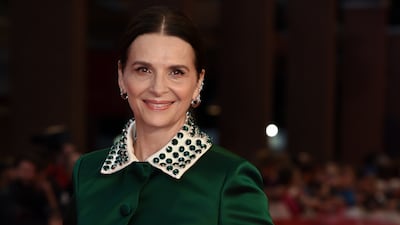One of France’s most celebrated acting talents, Juliette Binoche is famed for her work in film, theatre and even dance. But television? Not so much.
Now, though, the woman they call La Binoche stars in The New Look, a 10-part Apple TV+ series about fashion legends Coco Chanel and Christian Dior created by Damages’ Todd A Kessler.
For Binoche, who turns 60 in March, it was a shock to the system to adapt to the demands of American television. “It felt like … a marathon,” she tells The National from Paris. “But I went through it. It was rough. Because you have scripts coming, coming, coming in the last minute, then you have to prepare. And you’ve got to have a little preparation.” It didn’t help that she completed her recent hit foodie movie The Taste of Things only a month earlier, a more sedate shoot next to the rigours of TV. “It was such a different world and different energy.”
Set during the Second World War Nazi occupation of Paris, The New Look focuses on the moment when Dior (played by Australian actor Ben Mendelsohn) rises to prominence just as Chanel’s reign as fashion queen is beginning to wane. “I was passionate about her,” Binoche says. “She’s complex. But it’s so important to understand that she came from a very poor background … as Dior came from a very bourgeois background, even though he was destroyed afterwards."
Paired in the show with some remarkable co-stars, including John Malkovich and Game of Thrones’ Maisie Williams, Binoche took her time to research Chanel – a figure who has been played in French cinema numerous times (Audrey Tautou in Anne Fontaine’s Coco Before Chanel; Shirley MacLaine in Coco Chanel; and Anna Mouglalis in Coco Chanel & Igor Stravinsky, to name but three that have made it to screen in the past two decades). “I really had time to develop and learn about her,” Binoche says.
“I read quite a lot of books because it was very difficult to find who she was, really, because she was hiding from her past and hiding dark sides, maybe. So in order to really understand who she was, it took a while, but I found it fascinating. She had a thousand lives, not just one. Very charismatic. Her energy, I think, was under high pressure ... she had coffee since she was born! She was such an artist in her own way.”
Certainly, it all marks a unique period in Binoche’s career. Her recent foray into television, HBO thriller The Staircase with Colin Firth and Toni Collette, arguably re-introduced an actress famed for working with European and Asian directors to American audiences.
“I’ve been forgotten [there]. [By] the new generation anyway … unless it’s in Chocolat,” she says, referring to Lasse Hallstrom treacly confection from 2000, which scored Binoche a second Oscar nomination after she won Best Supporting Actress for The English Patient in 1996.
“I remember there was a little girl with her mum. And the mum said to the girl: ‘You see her? She’s from Chocolat.’ And the girl said, ‘No, it’s not her!’ And then she went away and she looked at me like that [screwing up her face].” Binoche howls with laughter, proof that she’s not so precious about her reputation. “But I have lots of memories in America: friends, then shooting in America and I had a boyfriend in America. So it depends where I’m putting my memory. But, no, I’m enjoying the ‘coming back’. That’s fun.”
But then, Binoche has always been much more than an actress, which may be why she works best outside the Hollywood studio system. “I’m a creator as much as the director. I’m not a tool,” she says. Has it always been like that? “I think so. I mean, it depends which director you’re working with, but you have to provoke the director as well as the director provoke you. Because you’re not being passive. You’re being in action. There’s a creator in you. In each of us, there’s a creator.”

This being Binoche, she hasn’t stopped working since The New Look. Most excitingly, she’s completed The Return, reuniting with Ralph Fiennes – her co-star from The English Patient. This time, they’re re-telling the classic Greek myth of Odysseus and Penelope.
“Penelope is really the ideal of this woman waiting forever, of the man who’s going to war and having so many relationships,” she says. “And she is still there always, perfect. Actually, I like [director] Umberto Pasolini’s point of view because it was not that idyllic.” She’s also wrapped the London-set Queen at Sea, in which she plays a mother who returns to the city with her teenage daughter amid concern for her ageing mother, played by Anna Calder-Marshall. After a career that began in earnest four decades ago, working on Rendez-vous in 1985, does she still feel satisfied?
“Well, I’m happy with what I’m doing,” she says. “Yeah, definitely. It feels to me that the steps I went through are the steps that I wanted to go through.”
The New Look begins on Apple TV+ from February 14

